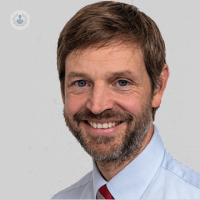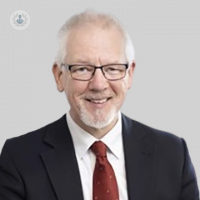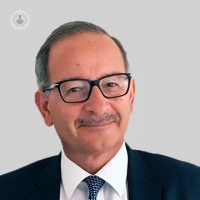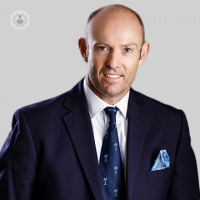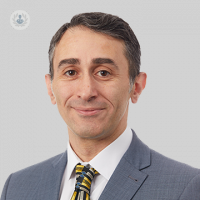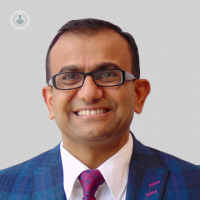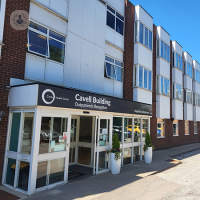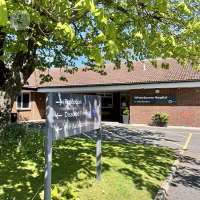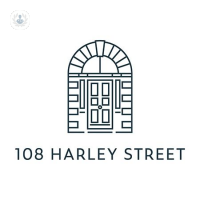What is a rotator cuff injury?
Rotator cuff injuries include inflammation, or partial or complete damage of the tendons of the shoulder. The rotator cuff is a group of four tendons that converge and surround the front, back, and top of the head of the humerus. These tendons are individually connected to very important muscles that cover the shoulder blade (scapula). When these muscles contract, they stimulate the rotator cuff tendons, causing the movements of elevation, separation, and internal and external rotation, hence the name "rotator cuff”.
The main injuries to the rotator cuff are tendonitis and tears:
- Tendonitis of the rotator cuff : occurs when the tendons of the joint become inflamed.
- Tears of the rotator cuff : when one of the tendons detaches from the bone. The tear may be partial or complete, and may occur suddenly or slowly over time.
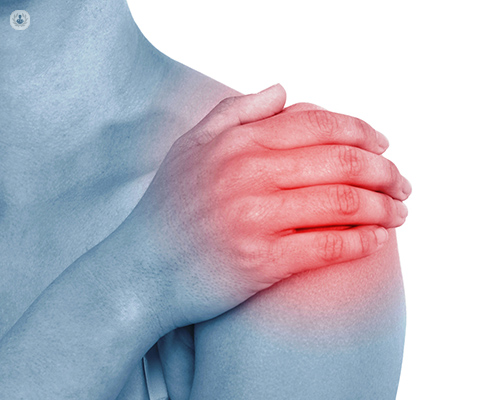
Prognosis:
Rotator cuff injuries are painful and can impede mobility, which has an impact on the patient's quality of life.
If the injured rotator cuff is not treated properly, it can cause chronic stiffness and weakness, and can progressively wear away the shoulder joint.
Symptoms of rotator cuff injuries:
The main symptoms of rotator cuff injuries are:
- Pain and tenderness in the shoulder, which may extend to the arm.
- Severe pain when lifting the arm sideways, lifting weight, or trying to reach behind oneself.
- Pain when sleeping on the affected shoulder.
- Mobility problems in the shoulder.
Medical tests for rotator cuff injuries:
The orthopaedic surgeon will begin with a physical examination in which he or she will press on different points of the shoulder and move the patient's arm, as well as examining the strength of the arms.
If the physical examination is not conclusive, imaging tests such as an ultrasound, X-ray or MRI may be used.
Can rotator cuff injuries be prevented?
Rotator cuff injuries can be prevented by avoiding activities that cause them, such as certain sports that involve arm movements (e.g. tennis or cricket). Also, certain jobs that require use of the arms for several hours, such as carpentry or painting. Exercising and strengthening the shoulders and arms is also a good way to prevent injuries.
Treatments for rotator cuff injuries:
In some cases, conservative treatment with rest, physical therapy exercises, and the application of ice is enough to treat a rotator cuff injury. In cases where conservative treatment is not enough, pain injections, physical therapy sessions, or surgery to repair the tendon or even a tendon transplant may be prescribed. This intervention can be done either by open surgery or laparoscopy.
Which specialist treats rotator cuff injuries?
An orthopaedic surgeon is the ideal specialist to diagnose and treat rotator cuff injuries. A physiotherapist will also be involved in the treatment and rehabilitation of the injury.
11-13-2012 11-14-2023Rotator cuff injury
Mr Andreas Baumann - Orthopaedic surgery
Created on: 11-13-2012
Updated on: 11-14-2023
Edited by: Conor Dunworth
What is a rotator cuff injury?
Rotator cuff injuries include inflammation, or partial or complete damage of the tendons of the shoulder. The rotator cuff is a group of four tendons that converge and surround the front, back, and top of the head of the humerus. These tendons are individually connected to very important muscles that cover the shoulder blade (scapula). When these muscles contract, they stimulate the rotator cuff tendons, causing the movements of elevation, separation, and internal and external rotation, hence the name "rotator cuff”.
The main injuries to the rotator cuff are tendonitis and tears:
- Tendonitis of the rotator cuff : occurs when the tendons of the joint become inflamed.
- Tears of the rotator cuff : when one of the tendons detaches from the bone. The tear may be partial or complete, and may occur suddenly or slowly over time.

Prognosis:
Rotator cuff injuries are painful and can impede mobility, which has an impact on the patient's quality of life.
If the injured rotator cuff is not treated properly, it can cause chronic stiffness and weakness, and can progressively wear away the shoulder joint.
Symptoms of rotator cuff injuries:
The main symptoms of rotator cuff injuries are:
- Pain and tenderness in the shoulder, which may extend to the arm.
- Severe pain when lifting the arm sideways, lifting weight, or trying to reach behind oneself.
- Pain when sleeping on the affected shoulder.
- Mobility problems in the shoulder.
Medical tests for rotator cuff injuries:
The orthopaedic surgeon will begin with a physical examination in which he or she will press on different points of the shoulder and move the patient's arm, as well as examining the strength of the arms.
If the physical examination is not conclusive, imaging tests such as an ultrasound, X-ray or MRI may be used.
Can rotator cuff injuries be prevented?
Rotator cuff injuries can be prevented by avoiding activities that cause them, such as certain sports that involve arm movements (e.g. tennis or cricket). Also, certain jobs that require use of the arms for several hours, such as carpentry or painting. Exercising and strengthening the shoulders and arms is also a good way to prevent injuries.
Treatments for rotator cuff injuries:
In some cases, conservative treatment with rest, physical therapy exercises, and the application of ice is enough to treat a rotator cuff injury. In cases where conservative treatment is not enough, pain injections, physical therapy sessions, or surgery to repair the tendon or even a tendon transplant may be prescribed. This intervention can be done either by open surgery or laparoscopy.
Which specialist treats rotator cuff injuries?
An orthopaedic surgeon is the ideal specialist to diagnose and treat rotator cuff injuries. A physiotherapist will also be involved in the treatment and rehabilitation of the injury.
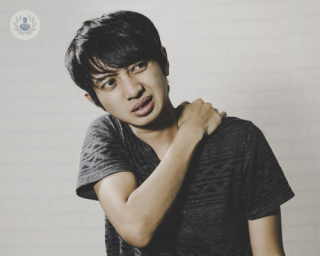

When is surgery required for a rotator cuff injury?
By Mr Ankit Desai
2025-02-05
Rotator cuff injuries are common shoulder problems that can range from mild inflammation to severe tears requiring surgical intervention. Leading consultant orthopaedic surgeon specialising in shoulder, elbow, and upper limb conditions Mr Ankit Desai aims to provide insight into when surgery becomes necessary for a rotator cuff injury. See more


Rock climbing injuries: Accurate diagnosis and effective treatment at an arm’s reach
By Mr Simon Moyes
2025-02-05
In this detailed guide on preventing, diagnosing, and treating rock climbing injuries, renowned consultant orthopaedic and sports medicine surgeon Mr Simon Moyes provides expert insights. The leading specialist covers common rock climbing injuries and the movements that can strain climbers' bodies. See more
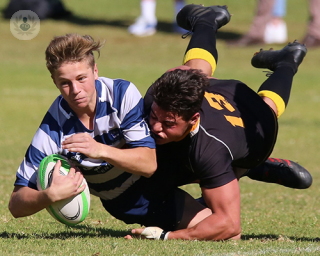

Preventing shoulder injuries in adolescent rugby players
By Mr Eyiyemi (Yemi) Pearse
2025-02-05
As young athletes grow and develop, their bodies undergo changes that can make them more susceptible to shoulder injuries, especially during high-impact sports like rugby. Understanding these injuries, their treatment options, and prevention strategies is thus crucial for ensuring the health and long-term performance of young athletes. Here, Mr Eyiyemi (Yemi) Pearse, renowned consultant orthopaedic surgeon, provides an expert insight. See more
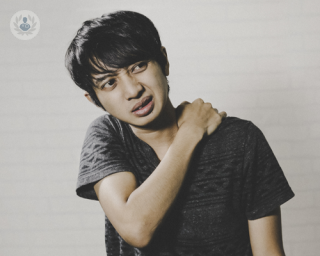

How soon after a shoulder arthroscopy can you exercise?
By Miss Claire Fitzgerald
2025-02-05
The timeline for resuming exercise following a shoulder arthroscopy varies depending on the specific procedure performed, the extent of the repair and your overall health. In general, a phased approach to exercise is recommended to allow the shoulder to heal while gradually rebuilding strength and mobility. Here’s a general outline of what to expect: See more
Experts in Rotator cuff injury
-
Mr Simon Lambert
Orthopaedic surgeryExpert in:
- Shoulder instability
- Arthritis
- Rotator cuff surgery
- Rotator cuff injury
- Shoulder surgery
- Shoulder replacement
-
Mr Ali Al-Sabti
Orthopaedic surgeryExpert in:
- Shoulder arthroscopy
- Rotator cuff surgery
- Rotator cuff injury
- Arthroscopic subacromial decompression
- Shoulder replacement
- Shoulder surgery
-
Mr Graham Tytherleigh-Strong
Orthopaedic surgeryExpert in:
- Shoulder surgery
- Shoulder instability
- Rotator cuff injury
- Sports injuries
- Elbow
- Sternoclavicular joint
-
Mr Omar Haddo
Orthopaedic surgeryExpert in:
- Shoulder surgery
- Rotator cuff injury
- Elbow Pain
- Wrist surgery
- Hand injury
- Frozen shoulder
-
Mr Ravi Badge
Orthopaedic surgeryExpert in:
- Carpal tunnel syndrome
- Cubital tunnel syndrome
- Trigger finger
- Thumb Osteoarthritis
- Epicondylitis (tennis elbow)
- Rotator cuff injury
- See all

The Cavell Hospital - part of Circle Health Group
The Cavell Hospital - part of Circle Health Group
Cavell Dr, Uplands Park Rd, Enfield EN2 7PR
No existe teléfono en el centro.
By using the telephone number provided by TOP DOCTORS, you automatically agree to let us use your phone number for statistical and commercial purposes. For further information, read our Privacy Policy
Top Doctors

The Winterbourne Hospital - part of Circle Health Group
The Winterbourne Hospital - part of Circle Health Group
Herringston Rd, Dorchester DT1 2DR
No existe teléfono en el centro.
By using the telephone number provided by TOP DOCTORS, you automatically agree to let us use your phone number for statistical and commercial purposes. For further information, read our Privacy Policy
Top Doctors

108 Harley Street Medical
108 Harley Street Medical
108 Harley Street, W1G 7ET
No existe teléfono en el centro.
By using the telephone number provided by TOP DOCTORS, you automatically agree to let us use your phone number for statistical and commercial purposes. For further information, read our Privacy Policy
Top Doctors
-
The Cavell Hospital - part of Circle Health Group
Cavell Dr, Uplands Park Rd, Enfield EN2 7PR, North LondonExpert in:
- endoscopy
- Gastroenterology
- Shoulder and elbow
- Hand and wrist
- Otolaryngology
- Foot and ankle
-
The Winterbourne Hospital - part of Circle Health Group
Herringston Rd, Dorchester DT1 2DR, DorchesterExpert in:
- Hip
- Cataracts
- General Surgery
- Orthopaedic surgery
- Physiotherapy
- Knee
-
108 Harley Street Medical
108 Harley Street, W1G 7ET, W1G Marylebone LondonExpert in:
- Vascular Surgery
- Dermatology
- Diagnostic Imaging
- Women’s health
- Sports Medicine
- Rehabilitation
- Most viewed diseases, medical tests, and treatments
- Osteoporosis
- Ulnar nerve entrapment
- Peripheral nerve block
- Peripheral neuropathy
- Joint pain
- Lumbar herniated disc
- Spinal surgery
- Minimal access surgery (keyhole surgery)
- Shoulder pain
- Botulinum toxin (Botox™)
